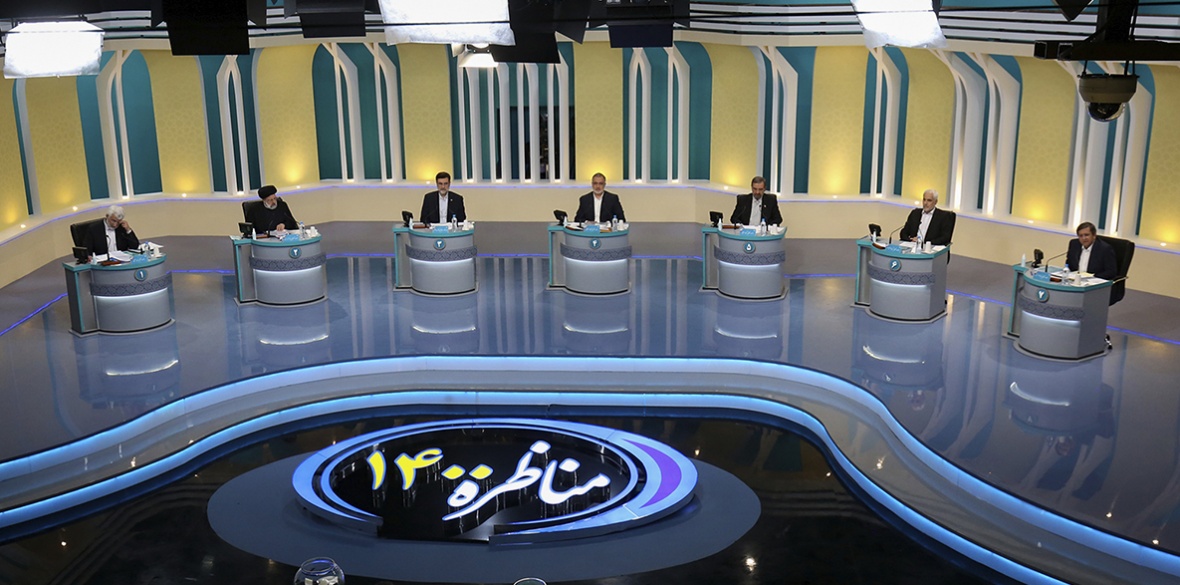
Iranian rights campaigners have warned that upcoming presidential elections will be the least free yet, with an unprecedented number of candidates disqualified.
As the presidential election campaign in Iran enters its final two weeks – with the election set to take place on Friday 18 June 2021 – the signs of a deep political and societal crisis are becoming ever more apparent. On Saturday (5 June 2021), in the first round of campaigning, the seven approved candidates – all loyalists of the regime – held an ineffectual pale shade of a public debate that failed to garner any enthusiasm from the wider public. The standard of debate and the scenes that accompanied them were in fact an embarrassment for the theocratic regime desperately grappling with its now manifest crisis of legitimacy in the eyes of the Iranian people. There are clear signs that the public intends to stay away from the polls.
Several of the well-known and respected political opposition forces in Iran, such as the Tudeh Party of Iran; the supporters of Dr. Mohammad Mossadegh (Iran’s progressive nationalist leader who led the movement for the nationalisation of the oil industry in Iran – and was subsequently overthrown in the notorious coup d’état of 18 August 1953, orchestrated by the CIA and MI6); the progressive National Religious Movement; and the Left Party of Iran (People’s Fadaian) as well as others, have already publicly called for the boycott of the election.
CODIR, which has closely followed the developments in Iran, is of the view that predictions indicating that more than 70% of the electorate will stay away from the polling stations are accurate – barring the possibility that the regime rigs or otherwise deploys its machinery to ‘compel’ a higher turnout. In his most recent sermons, Ayatollah Ali Khamenei, the Supreme Leader of the Islamic Republic, called on believers not to heed the increasingly loud calls for a boycott of the election. He admitted that there had been some “mistakes” in the vetting of candidates and called for these to be redressed.
Most commentators believe that the regime leaders have badly miscalculated the mood of public opinion when the nominations of a massive number of candidates were rejected outright by the all-powerful Council of Guardians of the constitution. Out of an initial shortlist of 40 candidates, the Council rejected all but 7 of them.
The regime has even rejected the candidacies of Velayat-e Faqih (‘Governance of the Jurist’) loyalists such as Eshaq Jahangiri, the current vice-president; Mostafa Tajzadeh, a senior advisor to the president and former interior minister; Ali Larijani, former parliamentary speaker; and Mahmoud Ahmadinejad, the former president.
It is no secret that the regime favours the election of Ebrahim Raisi, a conservative cleric and ‘Principlist’ (an Iranian political faction consisting of hard-line religious fundamentalists). Mr. Raisi is Iran’s current chief justice and was a member of the notorious “death committee” that presided over the mass executions of political prisoners in summer 1988 – when thousands of prisoners, mostly communists and socialists, were put to death by being hanged from cranes.
Iran is going through a critical chapter in its history. The country is blighted by economic bankruptcy due to the implementation of macro policies formulated by the clerical regime first and foremost to serve the interests of the country’s capitalists and powerful super-rich class – as well as the economic sanctions, especially anti-humanitarian sanctions, imposed by the US government in complete contravention of international law. As a result, tens of millions of Iranians live below the poverty line; unemployment levels are sky-high, especially among the youth; and inflation is rampant. To top this off, Iran has been devastated by the COVID-19 pandemic, wholly exacerbated by the regime’s feeble response – which has led to the deaths of more than 80,000 people and a further sharp deterioration of the woeful economic situation.
The outcome of the election on 18 June will no-doubt see the installation of an even more vicious, anti-democratic, and fiercely entrenched Islamist administration in Iran. This will in turn necessitate the beginning of an era of reinvigorated campaigning for the rights of the Iranian people – whether for trade union rights, women’s rights, the right to freedom of speech, the right to freedom of association, and so many more. This is where the international campaign of solidarity with the struggle of the Iranian people for peace, human and democratic rights, and social justice, must step up to demonstrate its effectiveness.
CODIR calls on the labour and trade union movement to join its campaign for human and democratic rights in Iran. The new administration in Iran should be left in no doubt that it cannot ignore public opinion whether inside Iran or around the world.












 Posted in
Posted in 











